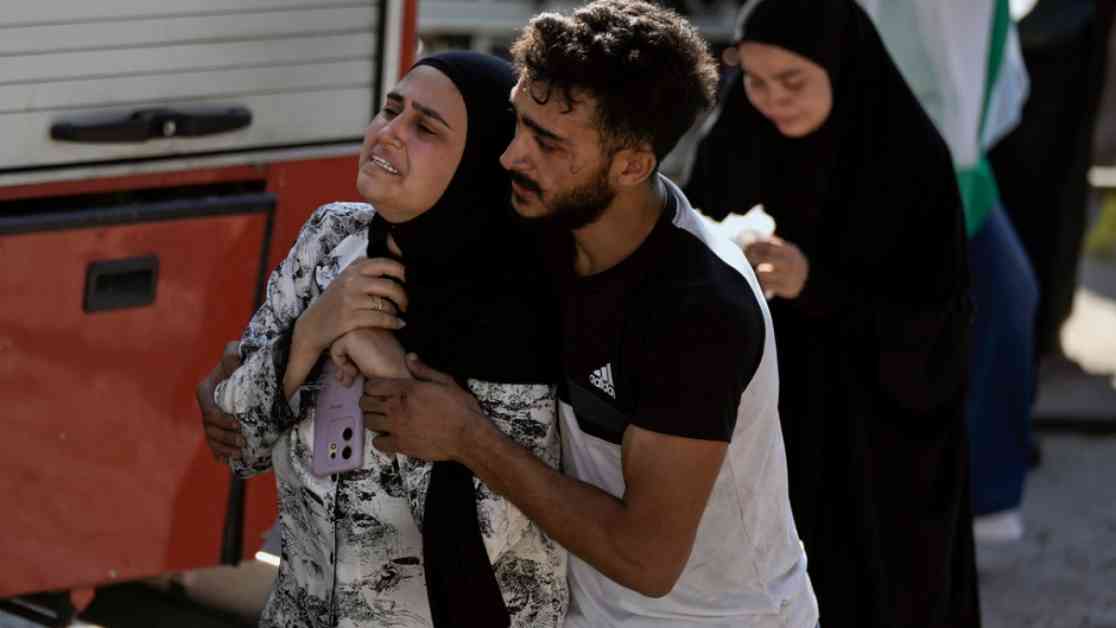Lebanon has once again been thrust into the midst of conflict and chaos as Israeli attacks have intensified, causing widespread devastation and displacement among civilians. The ongoing conflict between Israel and Hezbollah has left many Lebanese civilians facing unimaginable hardships, exploitation, and the constant threat of violence.
Escaping the Horrors of War
Umm Hassan, a Lebanese civilian living in the governorate of Nabatiya, found herself caught in the crossfire of the conflict when Israel began carpet bombing south Lebanon. Despite her initial reluctance to leave her home, she ultimately heeded the warnings of Hezbollah and evacuated with her family to avoid the imminent danger posed by the airstrikes.
The decision to flee was not an easy one for Umm Hassan, who expressed her defiance towards the Israeli forces by stating, “The [Zionists] don’t scare us.” She recounted the harrowing experience of witnessing Israeli warplanes hovering above her home, a stark reminder of the constant threat of violence that looms over the region.
The situation in Lebanon has escalated rapidly, with over 700 people losing their lives in the relentless bombing campaign by Israel. The toll of the conflict is staggering, with men, women, and children bearing the brunt of the violence and destruction. The indiscriminate nature of the attacks has left many Lebanese civilians feeling vulnerable and exposed to the horrors of war.
International Efforts and Political Maneuvering
As international pressure mounts on Israel to de-escalate the conflict and seek a ceasefire with Hezbollah, the situation on the ground remains volatile and precarious. The US and France have called for a temporary ceasefire to prevent further bloodshed, but Israeli Prime Minister Benjamin Netanyahu has rejected the idea, vowing to continue the offensive until all objectives are met.
Netanyahu’s defiance has raised concerns about the potential for further escalation and the devastating impact it could have on civilian populations in Lebanon. The conflict has already taken a heavy toll on the country, with thousands of people forced to flee their homes and seek refuge in overcrowded displacement shelters and makeshift accommodations.
The political maneuvering and brinkmanship on both sides have only served to exacerbate the suffering of ordinary Lebanese civilians, who find themselves caught in the crossfire of a conflict not of their making. The specter of all-out war looms large over the region, with the potential for catastrophic consequences for all involved.
Exploitation and Social Tensions
The displacement crisis in Lebanon has exposed deep-seated social tensions and divisions within the country, with some communities reluctant to welcome displaced individuals for fear of harboring Hezbollah sympathizers. Reports of landlords exploiting the situation by raising rents to profit from the influx of displaced people have further exacerbated the hardships faced by those fleeing the conflict.
The fear and distrust among different communities in Lebanon have created a volatile environment where tensions run high and suspicions abound. The displacement crisis has laid bare the fault lines within Lebanese society, revealing the underlying fractures that threaten to further destabilize the country in the midst of a bloody conflict.
As the conflict continues to escalate and the humanitarian crisis deepens, the need for a negotiated ceasefire and a lasting peace settlement becomes ever more urgent. The fate of Lebanon hangs in the balance, with the specter of all-out war casting a dark shadow over the region and its people.
In conclusion, the plight of Lebanese civilians enduring hardship and exploitation while fleeing Israeli attacks is a stark reminder of the human cost of conflict and the urgent need for a peaceful resolution to the ongoing crisis. As the international community grapples with the complexities of the situation, the voices of ordinary Lebanese civilians must not be forgotten or overlooked in the quest for a lasting peace in the region.



























